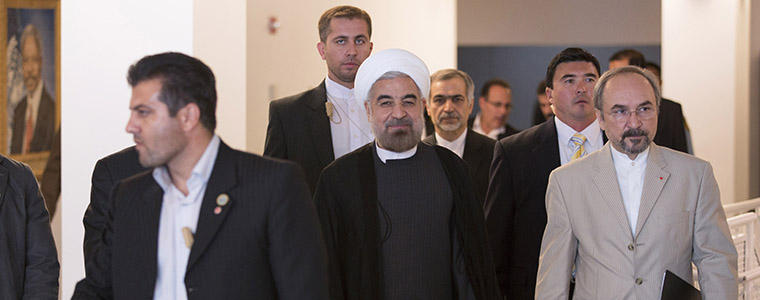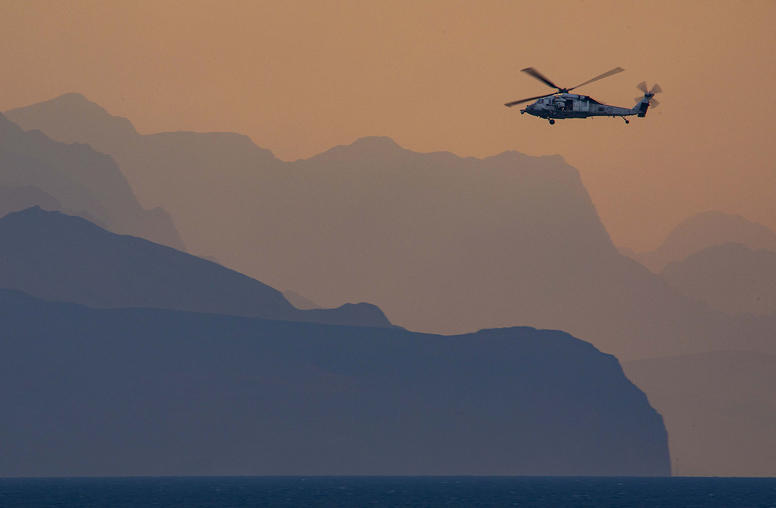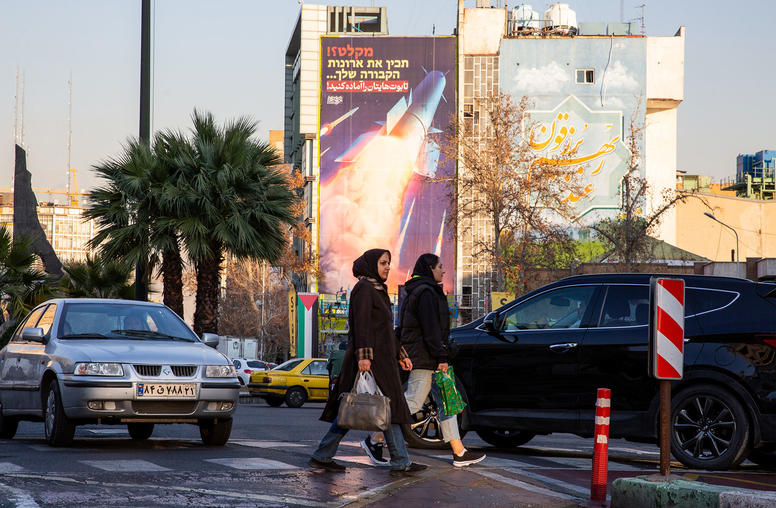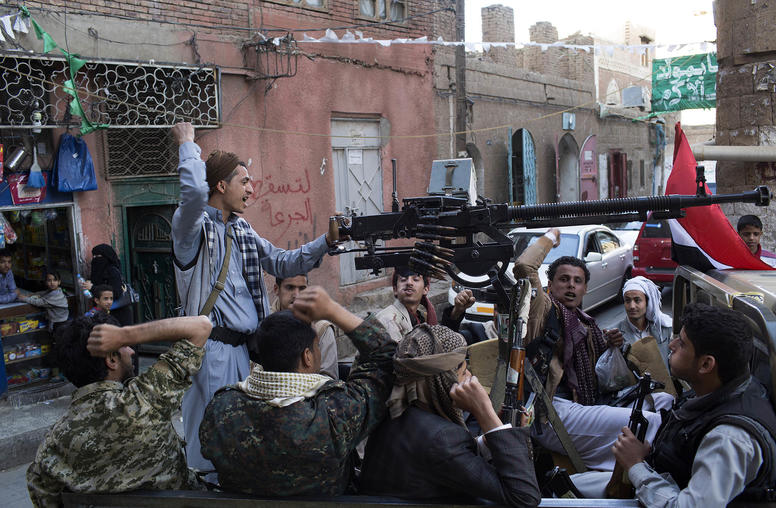A Moderate Proposal
A nuclear deal is going to be the key to domestic reform in Iran in 2014 -- or its downfall.
2014 promises to be a make or break year for U.S.-Iran policy -- and for the very future of Iran itself. Indeed, the Obama administration's capacity to influence events in the wider Middle East will hinge, in part, on whether it can negotiate the November 2013 Interim Nuclear deal to a final agreement.

The administration has already taken the very step that no previous one had dared imagine: it has decisively embraced diplomacy over military force, and brought strategic coherence to U.S.-Iran policy. But in moving forward the White House has also precariously raised the stakes: A collapse of the negotiations would not only signal that the region's most enduring global conflict is beyond the pale of rational solution -- the failure of nuclear diplomacy would kill also off the chances for internal political reform in Iran itself.
The prospects for opening Iran's political arena have always partly hinged on ending, or at least attenuating, the three-plus decades of U.S.-Iranian cold -- and sometimes hot -- war. Iran's hardliners have benefitted from, and even depended on, this conflict to sustain their domestic power. Going back to the mid-90s, they invoked the U.S. "threat" to justify repressing a reform movement which they accused of being a fifth column for a U.S. cultural "invasion." But their consolidation of power was also informed by the hard-liners' key assumption, and hope, that the U.S. would never run the military or political risks of a decisive choice between war or diplomacy. This bet in favor of strategic incoherence in U.S.-Iran policy turned out to be a good one.
Strange as it seems, this absence of strategic coherence was predicated on sanctions. Imposing sanctions supposedly proved U.S. determination to be "tough" on Iran, but by themselves they did not constitute a strategy. Instead, they acted as a Rorschach test to reflect the different desires of the key players. Many Israeli and Saudi leaders -- as well as some members of the U.S. Congress -- hoped that sanctions would force Iran to totally dismantle its nuclear enrichment program. Barring that unlikely outcome, sanctions were depicted as either a device to weaken Iran in the lead up to a military attack, or an ineffective mechanism whose inevitable failure would compel the U.S. to resort to force.
Israeli Prime Minister Benjamin Netanyahu has deployed both of these seemingly contrasting but ultimately converging views, declaring sanctions useless one day, only to praise them later as a tremendous success. Either way he probably never saw sanctions as an integral part of "dual track" strategy designed to facilitate a diplomatic solution. Seeing their diplomatic potential requires accepting the elemental premise that sanctions can, and indeed should, be eventually removed in return for a negotiated solution -- their purpose is not to achieve total victory, but rather to facilitate making peace.
The longer this politically expedient arrangement of everyone pretending to agree on the purpose of sanctions lasted, the more it benefitted Iran and its closest allies, including Syria. After all, a decade plus of strategic indecision allowed Tehran to expand its enrichment programs and to protect them by digging deeper. This not only ensured that Iran would have more to "bargain away" in any talks, it also raised the strategic costs and risks for the use of force. If by 2010 U.S. military leaders were signaling their lack of enthusiasm for an attack, this was because many had concluded that a military approach required weeks if not months of war with Iran -- after Iraq and Afghanistan it wasn't only the American public that opposed new military adventures.
Such calculations pointed to only one reasonable option: a diplomatic solution. It is interesting to note that the Obama administration apparently came to this conclusion months before Hassan Rouhani's surprise election -- well before most U.S. Iran experts could envision Iran's domestic politics tolerating the return of former Ambassador to the UN Javad Zarif, and his pragmatic foreign policy camp, as Rouhani's foreign minister. Now that they are leading Iran's nuclear policy team -- with, of course, the Supreme Leader's critical blessing (or at least acquiescence) -- the challenge facing the administration is to negotiate a final deal that Zarif and his allies can defend as a reasonable compromise without provoking retaliation from either domestic hard-line opponents or those in the U.S. and the Middle East who still think that Iran's total capitulation is a feasible goal.
Creating this sweet spot will be impossible if the U.S. imposes more sanctions. The oft-repeated Washington mantra that "sanctions got the Iranians to negotiate" is true, but only in a very limited sense: Sanctions have enhanced the domestic leverage of foreign policy pragmatists who, under Zarif's leadership, argue that the Obama administration is ready for a compromise that includes removing all nuclear-related restrictions. New sanctions will not only destroy the pragmatists' credibility -- it will decimate their wider bid to advance a new domestic reform project.
This project is far more about politics than economics. Rouhani is leading a still wobbly alliance of reformists and more moderate conservatives who are trying to reopen a political field that had become dangerously polarized after eight years of repressive rule. Thus the notion that Rouhani is nothing but "wolf in sheep's clothing" is profoundly wrong; Iran's new president and his political allies are more like agile rabbits trying to avoid the sharp claws of hard-line predators who would like nothing more than to reassert their mastery of the political terrain.
What separates hard-liners and pragmatists is elemental: the pragmatists want a more inclusive political détente at home, but cannot make progress without new policies of economic and political détente directed towards the Arab Gulf, Europe and the U.S; it is exactly this crucial link between domestic reform and international engagement that worries hard-liners. The hardliners know very well -- as do many advocates of a more pluralistic politics -- that a nuclear deal is a prerequisite for ending what Rouhani himself has called "the suppression and radicalism of the last eight years."
Thus far the Supreme Leader has restrained the hard-liners. Khamenei's support for the pragmatists is driven not merely by his desire to end sanctions, but more fundamentally, by his interest in reestablishing a political consensus that would rehabilitate his own authority as the master arbiter of the political arena. Whatever his ideological priorities -- always a matter of intense speculation by Washington's Iran specialists and foreign policy pundits -- it is hard-nosed calculations of political survival and state interest that are probably keeping the Supreme Leader in the game.
Should the U.S. and other P5+1 states indulge such calculations? Not if it means accepting a final nuclear deal that lacks the intrusive inspections and other tough safeguards mechanisms that the international community has demanded. But if Washington can get a reasonable compromise, it will align nuclear diplomacy with the long-term quest for a more open politics in Iran. Rather than take actions that derail this still fragile dynamic, the U.S. should emphasize the strategic gains that will accrue to all Middle East states when and if Iranian leaders who favor détente at home and abroad can finally claim a measure of real victory.
Reposted with permission from ForeignPolicy.com, Source: “A Moderate Proposal"



